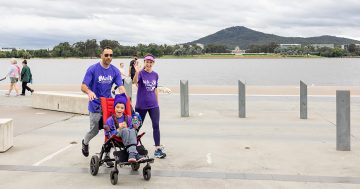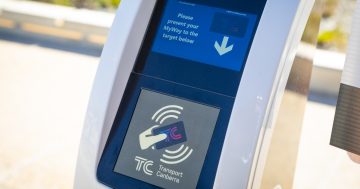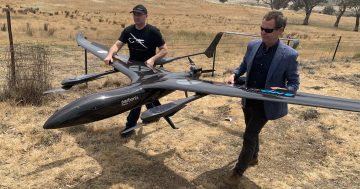
Mark Baldwin is one of thousands of Canberrans with epilepsy who will have access to a hotline six days a week along with other resources as part of the Epilepsy Smart Australia program. Photo: Mark Baldwin.
It was March ’96 when Mark Baldwin returned from his honeymoon and forgot he was married.
It had been a long time between epileptic seizures when a big one hit, and he had no idea they could lead to memory loss.
“I know now that in periods when I have lots of seizures it’s like deleting a hard drive, I lose huge chunks of my memory. Most of my teenage years are a blur,” he said.
“The memory of my marriage eventually crept back but you can imagine how jarring that was for my new wife.”
It wasn’t the last time one of Mark’s loved ones was caught off guard by one of his seizures.
“My children were so small the first time I had a tonic-clonic seizure in front of them,” he said.
“When I came to, there were all these tissues littered around me and two terrified little kids huddled together.
“They didn’t know what was happening, didn’t know what to do, so they just tried to clean up the blood with tissues.
“Another time, I had a seizure in front of my son. He must’ve been about three and he was too scared to be alone with me for some time after that. To have your child afraid of you, as a parent, it breaks your heart.”
An Australian is diagnosed with epilepsy every 33 minutes.
Mark said despite its prevalence the stigma and fear around epilepsy and associated seizures made it difficult for those living with the condition to talk about it.
It’s why he celebrated the recent launch of Epilepsy Smart Australia, a national partnership designed to provide the best knowledge and resources about the management of epilepsy to people with the condition, those who support them and the broader community.
Supported by the Federal Government, the program includes a new range of high-quality epilepsy services based on the latest evidence.
The collaboration of state-based epilepsy service providers, coordinated by the Epilepsy Foundation, it includes a comprehensive online resource and the National Epilepsy Support Service available six days a week.
Epilepsy ACT CEO Fiona Allardyce said Epilepsy Smart Australia was a “game-changer” for the thousands of people living with the condition in the Territory, and their support networks.
“We have no high end specialists in the ACT and a lot of the time, the latest information is not flowing back,” she said.
“Being part of a national program provides us access to specialist information from around the nation. It’s going to give us consistency across the country in training and awareness.
“More awareness – in schools, workplaces and so forth – will mean less stigma and that in turn means better outcomes for people with epilepsy.”
Federal funding as part of the program will also allow Epilepsy ACT to hire an additional support worker.
“That’s a massive step for the ACT,” Fiona said.
“It means if a client calls the office regardless of how they come to us, they’ll get someone trained and willing to help.”
Mark said Epilepsy Smart Australia gave people like him a place to direct family, friends, workplaces and schools to self-educate.
“As patient you tend to know your own illness, so the impact when you have a seizure is less on you than the people around you. Programs like these give you tools to prepare the people supporting you.
“It’s a resource they can access themselves where they can find out everything they need to know. It’s evidence based, it’s factual and if nothing else, it’ll steer you in the right direction to get more information.”

The Epilepsy Smart Australia program provides the nation with the best knowledge and resources about epilepsy management. Photo: Epilepsy Smart Australia.
Mark said he wished Epilepsy Smart Australia had been around when he was first trying to figure out how to inform his loved ones about his condition.
“I wish I had had tools to have those conversations with my kids earlier. If I’d been able to explain it to them before, if we had put systems in place to manage it, they would never have had to experience it the way they did and I would never have had to see my little boy scared of me,” he said.
“I think a lot of the time with chronic illnesses we tend to push them aside. It makes the impact when they do come out so much more damaging. The more we demystify them, the more accepted they become in the community and the easier they are to manage.”
Visit Epilepsy Smart Australia for more information.





















